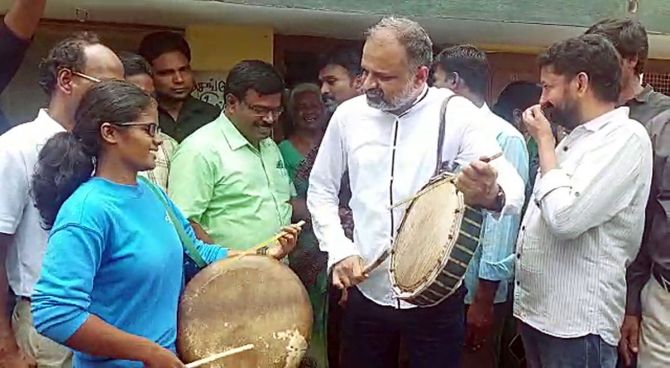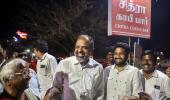A G Perarivalan alias Arivu is now a free man following a legal battle, and that long fight provides scope for throwback moments of Tamil sentiment that propelled the struggle which was backed by most political parties and successive governments in Tamil Nadu.

The clamour by pro-Tamil outfits for the release of Rajiv Gandhi assassination case convicts began well over a decade ago and their demand's undercurrent was that they were Tamil people who had championed the Tamil cause and have undergone punishment for decades.
"Ezhu Tamizhar Viduthalai,' which means 'The release of 7 Tamils', became a popular outcry over a period of time in Tamil Nadu.
The demand had the strong backing of Dravidian majors, the Dravida Munnetra Kazhagam and the All India Anna DMK, and the Tamil Nadu Congress, apparently in view of the sentiments involved was prompted to declare in 2020 that if the court announces the release of the seven convicts it was acceptable to it. The Congress party however said then that political parties demanding their release was completely unacceptable.
On top of all such factors, Congress leader Rahul Gandhi, during his election campaign last year in Puducherry, had said that he had forgiven those responsible for his father Rajiv Gandhi's killing.
The demand for their release was backed by almost all other parties including the Viduthalai Chiruthaigal Katchi. The May 17 Movement is among the prominent pro-Tamil outfits in Tamil Nadu.
Though the state unit of the Bharatiya Janata Party was opposed to their release, it became apparent over the years that the saffron party too found it a touchy subject and tried its best to handle the matter in a subtle fashion.
The Tamil sentiment in the Rajiv case context stems from the sufferings of the Tamil people in Sri Lanka, political commentator M Bharat Kumar said.
"The Tamil nationalists' argument is that the case against Perarivalan was fabricated and they see those convicted in this case as people who championed the Tamil cause and regard them as victims and hence a need to fight for their cause," he told PTI.
Since these convicts have also suffered punishment in the case, the demand for their release found acceptance with several other sections of the people and their voices grew stronger, he said.
"When this demand found acceptance, and especially when it is associated with Tamil sentiments, the AIADMK and DMK have no choice but to back it," he said.
"Tamil nationalist supporters also have pointed out repeatedly that late LTTE supremo V Prabhakaran had said in 2002 that the killing of Rajiv Gandhi was a tragic incident," Kumar added.
Social media posts from the Tamil diaspora also showed jubilation over the release of Perarivalan and a new hope for the release of others in the case.
Naturally, all those sympathetic to the Tamil cause lent their support to the legal battle of the Rajiv case convicts.
Perarivalan, aged 19 when he was arrested in 1991, allegedly bought two batteries that went into the making of a bomb used for assassinating Rajiv Gandhi.
V Sriharan alias Murugan, T Suthendraraja alias Santhan, Jayakumar, Robert Payas, P Ravichandaran and Nalini are in jail since 1991. Together with Arivu, they are the seven people who are referred to as the '7 Tamils.'
When late chief minister J Jayalalithaa declared in 2014 that the sentences of life imprisonment of all the seven Rajiv case convicts would be remitted and that they would be released, the then Congress-led United Progressive Alliance government knocked on the doors of the Supreme Court against that move.
During the AIADMK regime (2011-21), the DMK exerted political pressure on the ruling party over the issue. In February 2021, K Palaniswami, who was the chief minister then, accused the DMK of enacting a 'political drama' on the issue of release of seven convicts with an eye on assembly elections.
An important factor to the Tamil sentiment background may be traced to the 1980s.
There is a perception among several sections of people in Tamil Nadu that then prime minister Rajiv Gandhi sending a peace keeping force (Indian Peace Keeping Force-IPKF) to Sri Lanka, though well-intentioned, resulted in 'brutalities' against the Tamil people.
It was also alleged by some parties that the IPKF functioned in a one-sided manner, often siding with the island nation’s authorities.
A fear perception also emerged among some Tamil groups in Sri Lanka that if the Congress party were to win the 1991 Lok Sabha polls in India, it may be detrimental to their interests.
It is an open secret that AIADMK founder leader and late chief minister M G Ramachandran was very sympathetic to the Tamil cause in Sri Lanka and the violence unleashed against the Tamil people in the neighbouring country had socio-political resonance in Tamil Nadu.
In May 1999, the apex court upheld the death sentence of four -- Murugan, Santhan, Perarivalan and Nalini -- commuted the death sentence of three to life, and freed the remaining 19.
On April 19, 2000, a cabinet meeting of the then DMK government recommended to then governor Fathima Beevi to commute the death sentence of Nalini Sriharan to life imprisonment out of the total four people whose capital punishment was upheld by the Supreme Court.
The death sentence of the remaining three convicts was commuted in February 2014 by the apex court on the ground of inordinate delay of 11 years in deciding on their mercy petitions.
Petitions of convicts seeking various reliefs saw a long legal battle both in the Madras high court and the Supreme Court.
The AIADMK government took a cabinet decision on September 9, 2018, and recommended to the governor the release all seven convicts.
Days after assuming office in 2021, Chief Minister M K Stalin urged President Ram Nath Kovind to accept the recommendation made by the state government in 2018 and remit the life sentences of the seven Rajiv case convicts and direct their immediate release.
Despite such sentiments and efforts to get them released, the families of victims of the 1991 suicide bombing staunchly opposed their release all along.
Former prime minister Rajiv Gandhi was assassinated on May 21, 1991, by woman suicide bomber Dhanu, just before the top Congress party leader was to address an election campaign at Sriperumbudur near Chennai.









